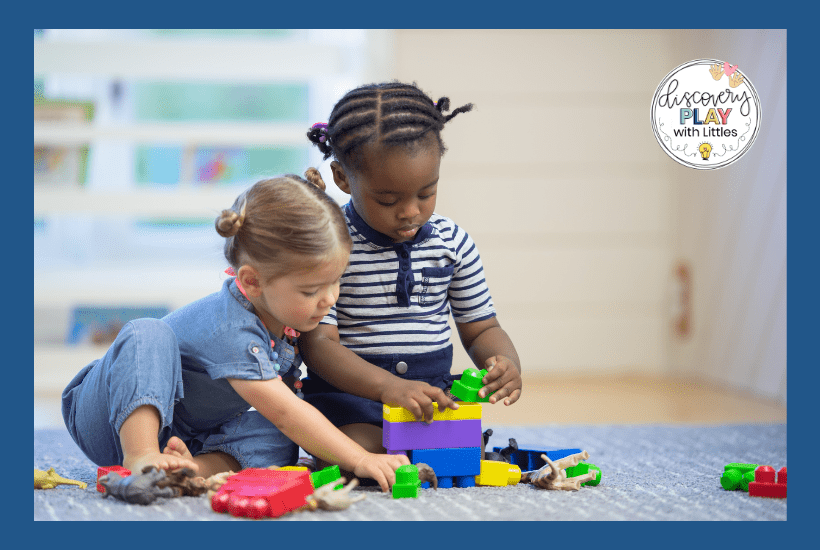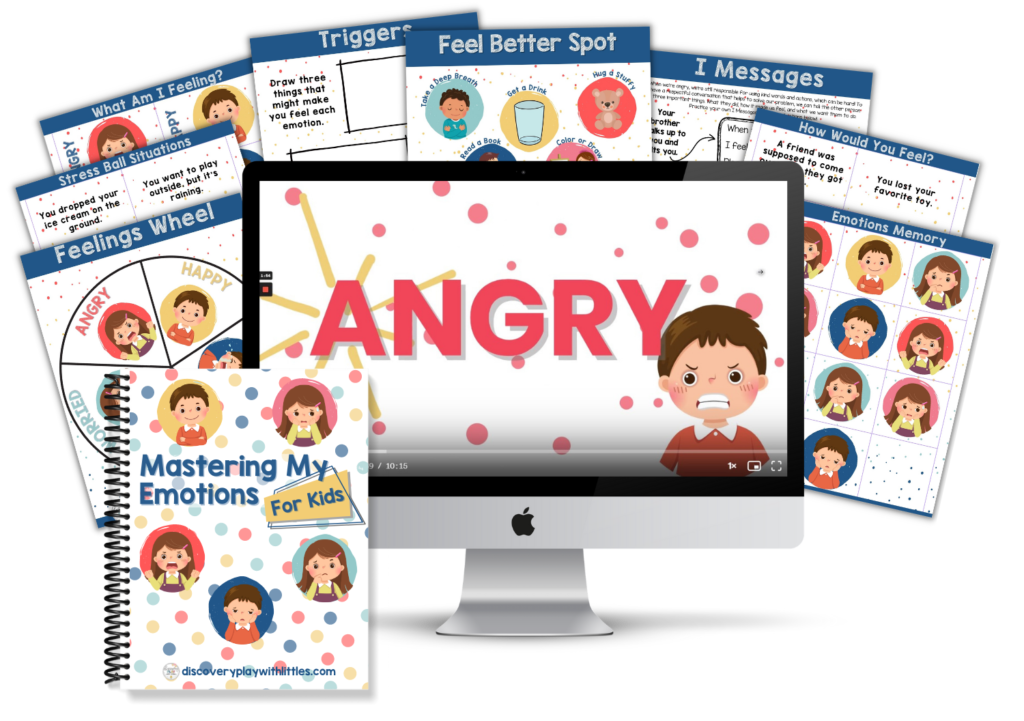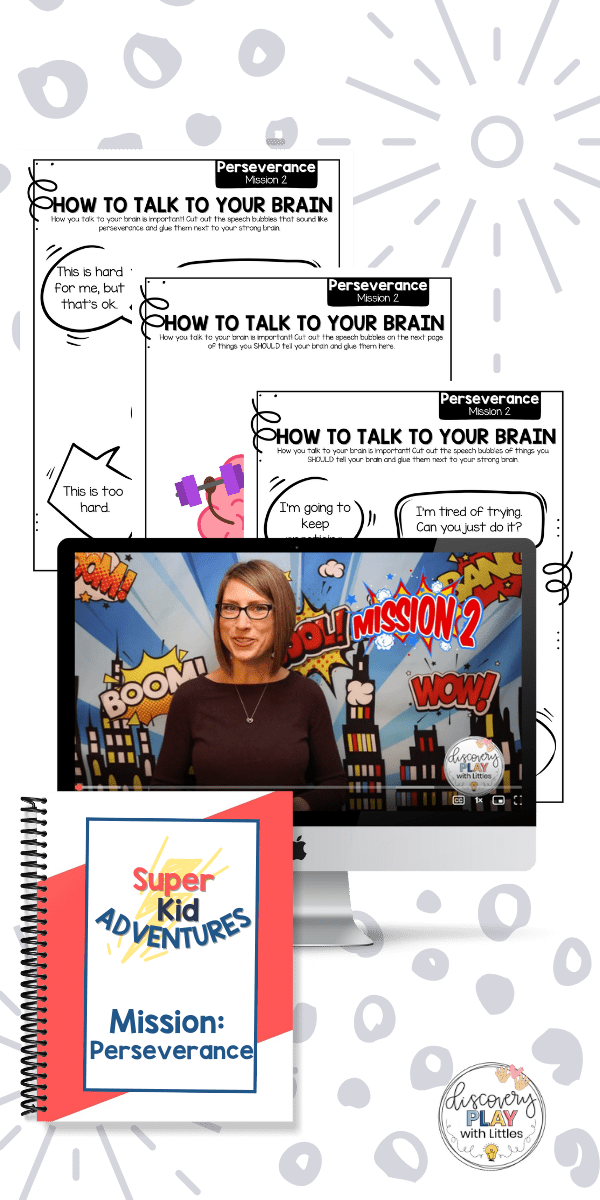

Inside: Social-emotional skills are essential for toddlers and preschoolers. They are the foundation of healthy relationships, happiness, and mental health. Discover our favorite social-emotional development activities for toddlers and preschoolers. These activities will strengthen their relationship skills and deepen their understanding of emotions and empathy.
My toddler walked up to his big brother, took the toy train out of his hand, and hit him. This did not go over well. When I finally stepped in to tell him no and try to diffuse the situation, tears fell from his eyes as he started to wail.
Oh, dear. Now I had a 5-year-old who was mad that the toy was taken from his hand, and a 2-year-old who was showing his dislike for the word ‘no.’
It’s time to work on some social-emotional skills.
Social-emotional skills are the skills that help us connect with others and control our emotions. They help us build healthy relationships, understand and manage our emotions, and feel empathy.

Social-emotional skills are essential skills for everyone, starting from birth. These are the skills that help us:
Any activity that strengthens your child’s social-emotional development is great for young children, but these are some of our favorite social-emotional activities:
Mastering My Emotions for Kids is an engaging online course for kids that teaches your kiddos effective strategies to deal with their BIG emotions in a healthy way so they can calm themselves down in the middle of a meltdown. (and you can say goodbye to all the crying, whining, and meltdowns…) Your kids will learn what each emotion looks like, sounds like, and feels like, along with healthy coping strategies. The games at the end help your kiddo get more comfortable identifying each emotion and give them a chance to practice a healthy way to work through their BIG feelings.

Reading is essential for many reasons. Books introduce your child to new vocabulary, story structure, beginning, middle, and end, and it gives your kiddo an opportunity to strengthen their empathy. Research shows our brains react to stories as if we were living them, so whenever you read a story about a character, your brain is practicing empathy.
This sounds simple, but it’s incredibly important. Starting from birth, kids need opportunities to interact with others. This is part of the reason that sticking a screen in front of them while you’re at a restaurant, driving, or during any downtime can be detrimental to their development. Kids need opportunities to interact and watch how you interact with others. Even if they can’t talk yet, they are constantly observing the people around them, and this grows their social skills.
Pretend play (also called role-play or dramatic play) is essential to kids’ development. Whether they’re pretending to work at a grocery store, be a doctor, or even play house, pretending to be in different social situations is important for their social-emotional development.
Kids look to us to learn so many things, and they’re always watching (much to my detriment). When we model healthy ways to handle stress and solve problems, kids will learn those skills too.
If you’re feeling frustrated or if you have a problem that’s difficult to solve, talk about that with your child. Tell them why you’re feeling frustrated and let them watch how you handle that. This shows kids that problems are normal, and it’s ok to feel frustrated, as long as we deal with those feelings in a healthy way.
Who says adults have to solve all the problems? Including children in the problem-solving process can help strengthen their understanding of the steps to solve a problem, and helps them learn to think outside of the box and find creative solutions for problems.

Using this one simple phrase you’ll get in this powerful lesson, you’ll not only be able to help your kiddo not give up but you’ll:
>Activate their superpower of perseverance so that they can turn around a meltdown and keep trying
>Inspire them to use perseverance…even when it’s hard
>Teach them to recognize the warning signs of giving up, and how to turn it around by taking control of their choices.
Grab your powerful FREE video lesson to teach your kiddo one of the most powerful keys to perseverance.
Get My Powerful Free Perseverance Lesson Now!
Toddlers are known for experiencing big feelings. Sometimes kids can even be scared of this new-to-them range of emotions because they aren’t sure if big emotions are a normal thing to feel and it can be scary. Helping kids understand their own emotions will help them learn how to best control them and it also helps kids learn how to relate to others.
This is a fun way to understand our feelings better. Draw faces showing different emotions on cards. On your turn, pick a card and act out that emotion. Everyone else guesses what you’re feeling. This gives your kiddo a chance to strengthen their mirror neurons by figuring out how you’re feeling.
If your kiddo loves masks like many young kids, this is a fun activity. Using paper plates, make a mask for different types of emotions. Put the masks on and act out situations that make you feel each emotion. This is a great opportunity for kids to deepen their understanding of WHY they feel the way that they do, which will also help them strengthen their empathy.
Stress balls also strengthen muscles in little fingers and hands! Fill balloons with uncooked rice or small beads. On each balloon, draw different facial expressions. Tell your kiddo situations, and have them grab and squeeze the emotion stress ball that represents how they would feel in each situation.
A simple way to teach emotions is as you go through your day, label emotions for your kiddo. A lot of the time, I’ll address the effect of the emotion. “I’m sorry you got hurt! Would you like a hug?” or “ Oh, we don’t throw things! Can you put it down nicely?”
But those things aren’t teaching kids what they’re feeling (and that it’s normal!) Adding a label for the emotion they’re feeling to what you’re already saying can help toddlers understand what they’re feeling. “I’m sorry you got hurt! I bet that made you feel sad. Would you like a hug?”
Toddlers are known for their big emotions, and that can be scary to them if they can’t name them. Young kiddos don’t know big feelings are normal, and they don’t know how to handle them yet. Hanging a feelings poster somewhere accessible will help kids to name what they’re feeling, and will also normalize the emotions. When they are having a big feeling ask them to point to the picture that shows how they’re feeling.
Problem-solving is a skill that takes a lot of practice and hard work, and it can be frustrating when you have a problem you don’t know how to solve in an appropriate way. Kids have to use perseverance to keep trying again and again to find a solution. Grab your free lesson from Super Kid Adventures that helps kids build perseverance by learning what to tell their brains.
Grab a pile of small objects and sort them by size, shape, and color. Sorting is a great way to practice problem-solving because most of the time, objects can fit in more than one category. This gives kids opportunities to make decisions and solve their problems.
Instead of trying to solve the problem, try to guide your kiddo as they try to solve the problem by asking open-ended questions.

If you’re looking for more concrete lessons, you may be interested in our course for kids, Super Kid Adventures. This course is jam-packed with engaging, short video lessons that teach your kids to activate their superpowers of Perseverance, Empathy, Friendship, Responsibility, and Wellness.
After they watch a short video lesson, they can choose to complete a fun activity. This course will transform your kids from having a meltdown every time something is difficult and struggling to create lasting friendships, to using perseverance, believing in themselves, building healthy relationships that last, happily pitching in around the house, and taking care of their heart, mind, body, and relationships in a healthy way. Learn More Here.
Emotional intelligence is important for kids to strengthen starting from a young age. By using different fun games, activities, reading books, and by watching your good example, kids can strengthen their social-emotional skills.
This equips them to better understand and express feelings, understand others’ feelings, and build healthy relationships, and will lead to overall happiness and healthy relationships. We want to start giving them opportunities to strengthen these skills now, so the next time their little brother takes a toy out of their hand and hits them, they will be prepared with valuable social skills and know how to appropriately handle the situation without completely flipping their lid.
If you liked this, you’ll love:
What are your favorite social-emotional development activities?
Elizabeth is a mama of two boys, a former teacher, and the founder of Discovery Play with Littles. Her mission is to make raising kids with character simple and fun. Join us for our best learning through play ideas, character growth activities, and family connection ideas so you can watch your child thrive.